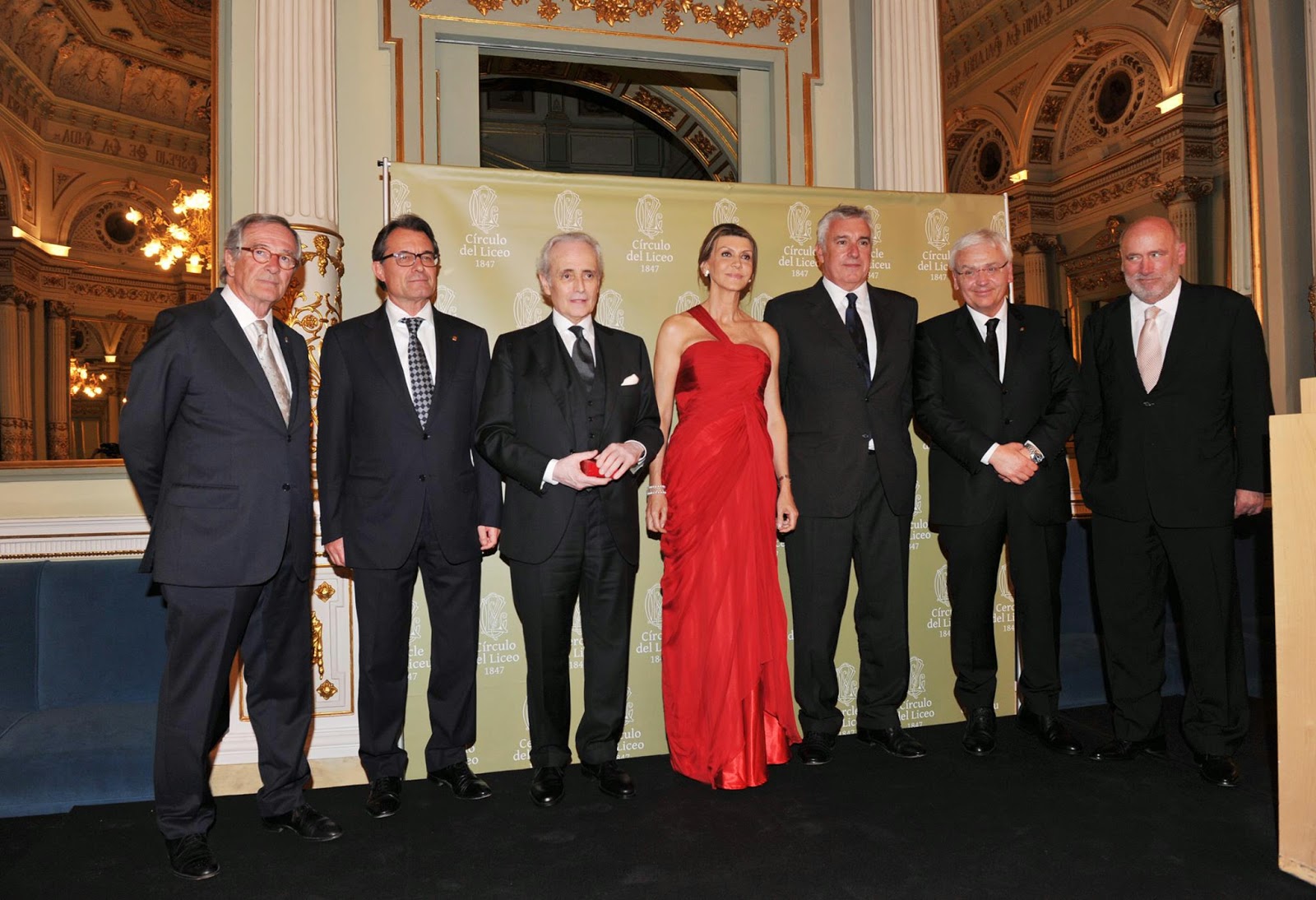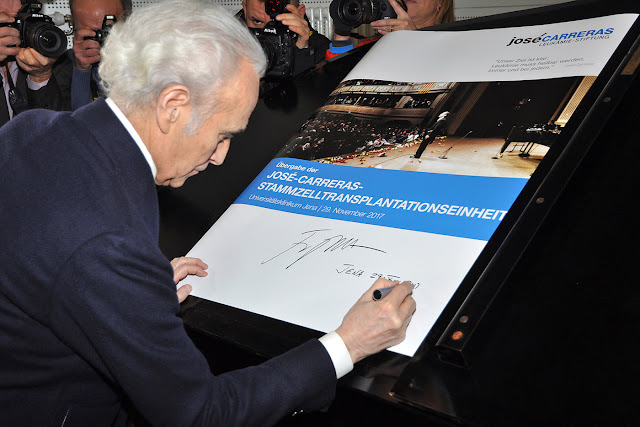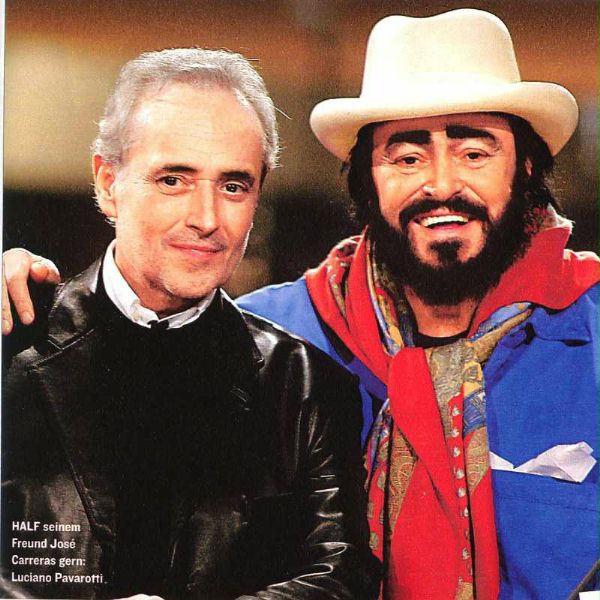Josep Carreras honored with the Gold Medal of the Cercle del Liceu
Dopo aver ricevuto la Medalla d'or del Liceu nel 2009, Josep Carreras è stato onorato con la Medalla d'or del Cercle del Liceu, entità di cui è membro dal 1982, per la carriera ed il suo vincolo con il teatro. La cerimonia si è tenuta mercoledì sera, 6 maggio, prima presso il Cercle alle 21:30 con una cena presso il Saló dels Miralls del Gran Teatre del Liceu, durante la quale ha avuto luogo la consegna.
Hanno presenziato all'evento il Presidente della Generalitat de Catalunya, Artur Mas, il sindaco di Barcellona, Xavier Trias, la delegata del governo in Catalogna, María de los Llanos de Luna, il presidente del Cercle del Liceu, Ignacio García-Nieto, il consigliere culturale della Generalitat, Ferran Mascarell, il presidente del Patronato del Gran Teatre del Liceu, Joaquim Molins e più di 100 invitati, tra cui il critico musicale Roger Alier, il giornalista Màrius Carol, e alcuni membri della famiglia Carreras, come i figli del tenore, Júlia e Albert Carreras, e il direttore d'orchestra David Giménez.
VIDEO
newscaster.ikuna.com
www.8tv.cat (2:22)
YouTube
Appena di ritorno da Bilbao dove ha vissuto il suo trionfale ritorno operistico con El Juez, a distanza di 8 anni dall'ultima interpretazione di un'opera completa, Josep Carreras viene onorato dalla propria casa artistica. Non solo questo barcellonese universale ha regalato al Liceu alcune delle notti più indimenticabili della sua storia recente, come ha osservato García Nieto, il Liceu per Carreras è stato "scuola, cattedra e olimpo, ma soprattutto casa": questa definizione è sicuramente stata uno dei punti emotivamente più alti della presentazione svolta da Màrius Carol, direttore de La Vanguardia, e co-autore delle memorie di Josep Carreras, "A viva voz", tradotte in catalano "De viva veu" e in tedesco "Aus vollem Herzen".
Per questo motivo, Josep Carreras, già negli ambienti del Circolo, aveva sottolineato l'importanza di sapere dove si è e di mostrare gratitudine per ciò che la gente fa per qualcuno. Ha sostenuto quindi, che quando un riconoscimento del genere arriva da casa, suscita ancora più soddisfazione, ed è questo il caso, avendo sempre considerato il Liceu, "forse con arroganza" come ha detto, la propria casa artistica.
Maggior soddisfazione, quindi, insieme all'emozione e alla gratitudine per aver pensato a lui che, con questo riconoscimento, raggiunge i colleghi Montserrat Caballé, Plácido Domingo e Jaume Aragall, precedentemente premiati.
Anche il critico Roger Alier ha fatto memoria di vari successi indimenticabili di Carreras, al Liceu come al di fuori. Il Presidente della Generalitat, Artur Mas, si è invece concentrato maggiormente al suo profondo legame con le origini e l'impegno nei confronti del paese: ha infatti lodato il suo essere "un català universal, amb projecció arreu del món”, e allo stesso tempo “ser un català de soca-rel, en el sentit d’exercir plenament el compromís amb el país”, che non ha mai nascosto l'amore per la sua terra. Ha giustamente ricordato anche il suo impegno sociale, evidente in diverse iniziative, in particolare nella sua Fundació contra la leucèmia e il suo Institut de Recerca, ma senza rinunciare a ribadire le sue grandi qualità di artista, "l’entrega i la passió permanent en la seva professió, amb la música i amb l’òpera”, elementi che dimostrano che ha amato sempre il suo mestiere.
ENHORABONA, JOSEP!!!
VIDEO
newscaster.ikuna.com
www.8tv.cat (2:22)
YouTube
 |
| Photo: Antoni Bofill |
Appena di ritorno da Bilbao dove ha vissuto il suo trionfale ritorno operistico con El Juez, a distanza di 8 anni dall'ultima interpretazione di un'opera completa, Josep Carreras viene onorato dalla propria casa artistica. Non solo questo barcellonese universale ha regalato al Liceu alcune delle notti più indimenticabili della sua storia recente, come ha osservato García Nieto, il Liceu per Carreras è stato "scuola, cattedra e olimpo, ma soprattutto casa": questa definizione è sicuramente stata uno dei punti emotivamente più alti della presentazione svolta da Màrius Carol, direttore de La Vanguardia, e co-autore delle memorie di Josep Carreras, "A viva voz", tradotte in catalano "De viva veu" e in tedesco "Aus vollem Herzen".
Per questo motivo, Josep Carreras, già negli ambienti del Circolo, aveva sottolineato l'importanza di sapere dove si è e di mostrare gratitudine per ciò che la gente fa per qualcuno. Ha sostenuto quindi, che quando un riconoscimento del genere arriva da casa, suscita ancora più soddisfazione, ed è questo il caso, avendo sempre considerato il Liceu, "forse con arroganza" come ha detto, la propria casa artistica.
Maggior soddisfazione, quindi, insieme all'emozione e alla gratitudine per aver pensato a lui che, con questo riconoscimento, raggiunge i colleghi Montserrat Caballé, Plácido Domingo e Jaume Aragall, precedentemente premiati.
Anche il critico Roger Alier ha fatto memoria di vari successi indimenticabili di Carreras, al Liceu come al di fuori. Il Presidente della Generalitat, Artur Mas, si è invece concentrato maggiormente al suo profondo legame con le origini e l'impegno nei confronti del paese: ha infatti lodato il suo essere "un català universal, amb projecció arreu del món”, e allo stesso tempo “ser un català de soca-rel, en el sentit d’exercir plenament el compromís amb el país”, che non ha mai nascosto l'amore per la sua terra. Ha giustamente ricordato anche il suo impegno sociale, evidente in diverse iniziative, in particolare nella sua Fundació contra la leucèmia e il suo Institut de Recerca, ma senza rinunciare a ribadire le sue grandi qualità di artista, "l’entrega i la passió permanent en la seva professió, amb la música i amb l’òpera”, elementi che dimostrano che ha amato sempre il suo mestiere.
ENHORABONA, JOSEP!!!
ENGLISH
After receiving the Gold Medal of the Gran Teatre del Liceu in 2009, Josep Carreras has been honored with the Medalla d'Or del Cercle del Liceu , an entity he has been a member of since 1982, for his outstanding career and his bond with the opera house. The ceremony was held on Wednesday, 6 May, before at the Cercle's rooms and then, at 9:30pm at the Salo dels Miralls the Gran Teatre del Liceu, with a special dinner during which the act took place.
Among the remarkable people attending, the President of the Generalitat de Catalunya, Artur Mas, the Mayor of Barcelona, Xavier Trias, the delegate of the Government of Catalonia, María de los Llanos de Luna, the President of the Cercle del Liceu, Ignacio García - Nieto, the cultural counselor of the Generalitat, Ferran Mascarell , the President of the Patronato del Gran Teatre del Liceu, Joaquim Molins, and more than 100 guests, including the critic Roger Alier, the journalist and writer Màrius Carol, and some members of the Carreras family, such as his daughter Júlia and his son Albert, and the conductor David Giménez.
Just back from Bilbao where he had just experienced his triumphant comeback to staged opera with El Juez, after several years since his last performance with a full opera, Josep Carreras has been honored by his own artistic home. Such universal man from Barcelona not only provided some of the most memorable nights of the Liceu's recent history, as noted by García Nieto, but actually the Liceu has been for him "school, teaching chair and Olympus, but mostly his own house": such definition was undoubtedly one of the highest points of the emotional presentation carried out by Màrius Carol, editor of La Vanguardia, and co-author of Josep Carreras' memoirs, "A viva voz" , translated into Catalan as "De viva veu" and in German "Aus vollem Herzen".
For this reason, Josep Carreras, already in the rooms of the club, had stressed the importance of knowing where one is and of showing gratitude for what people do for someone. Then, he argued that when such a recognition comes from home, it involbes even more satisfaction and pleasure, and this is the case, as he has always regarded the Liceu, " perhaps arrogantly" as he said, as his artistic home.
Therefore, more satisfaction, together with emotion and gratitude for them to think of him who, with this recognition, reaches colleagues Montserrat Caballé, Plácido Domingo and Jaume Aragall previously awarded.
Even critic Roger Alier has evoked som unforgettable memory related to Carreras, both at the Liceu and outside.
The President of the Generalitat, Artur Mas, focused most of his deep feeling with his origins and his commitment to his country: he praised the tenor for being "a universal Catalan, with an international projection" and at the same time "a 'soca - rel' Catalan, in the sense of fully carrying out his commitment with the country", and for having never hidden his love for Catalonia. Mas has rightly pointed out also his social commitment, evident in a number of initiatives in particular in his Leukaemia Foundation and the Research Institute, but without avoiding stressing once again his great qualities as an artist, such as "the full devotion and constant passion towards his profession, to music and opera", elements proving that he always loved his job.




Comments
Post a Comment
Recent comments